Hospitality Business Toolkit Report: Financial, HR, and Legal
VerifiedAdded on 2020/10/22
|14
|3890
|485
Report
AI Summary
This report provides a comprehensive analysis of a hospitality business toolkit, using the Foopo restaurant as a case study. It begins with an examination of financial performance, including principles of managing financial performance, risk assessment, tax considerations, and financial organization. The report then delves into the double-entry bookkeeping system, providing examples of debits and credits, sales, and purchases. A basic trial balance is also presented. The second part of the report focuses on Human Resources, detailing the HR life cycle stages and their impact on employee retention, followed by a performance management plan. The third section covers various types of regulations that hospitality organizations must follow, and their impact on business decision-making. Finally, the report discusses different functional roles within the hospitality sector and various methods of communication, coordination, and monitoring within an organization. The report concludes with a summary of key findings and recommendations.
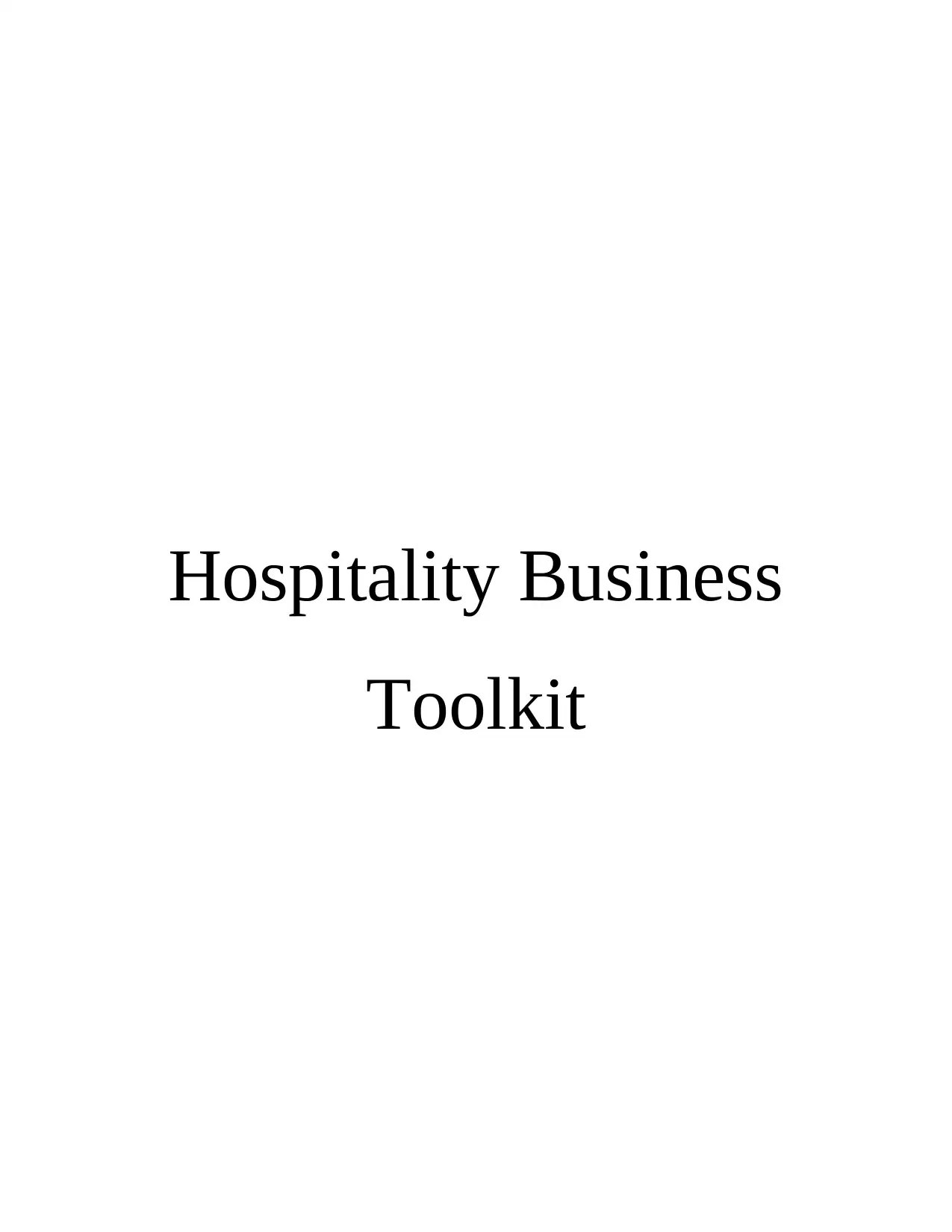
Hospitality Business
Toolkit
Toolkit
Paraphrase This Document
Need a fresh take? Get an instant paraphrase of this document with our AI Paraphraser
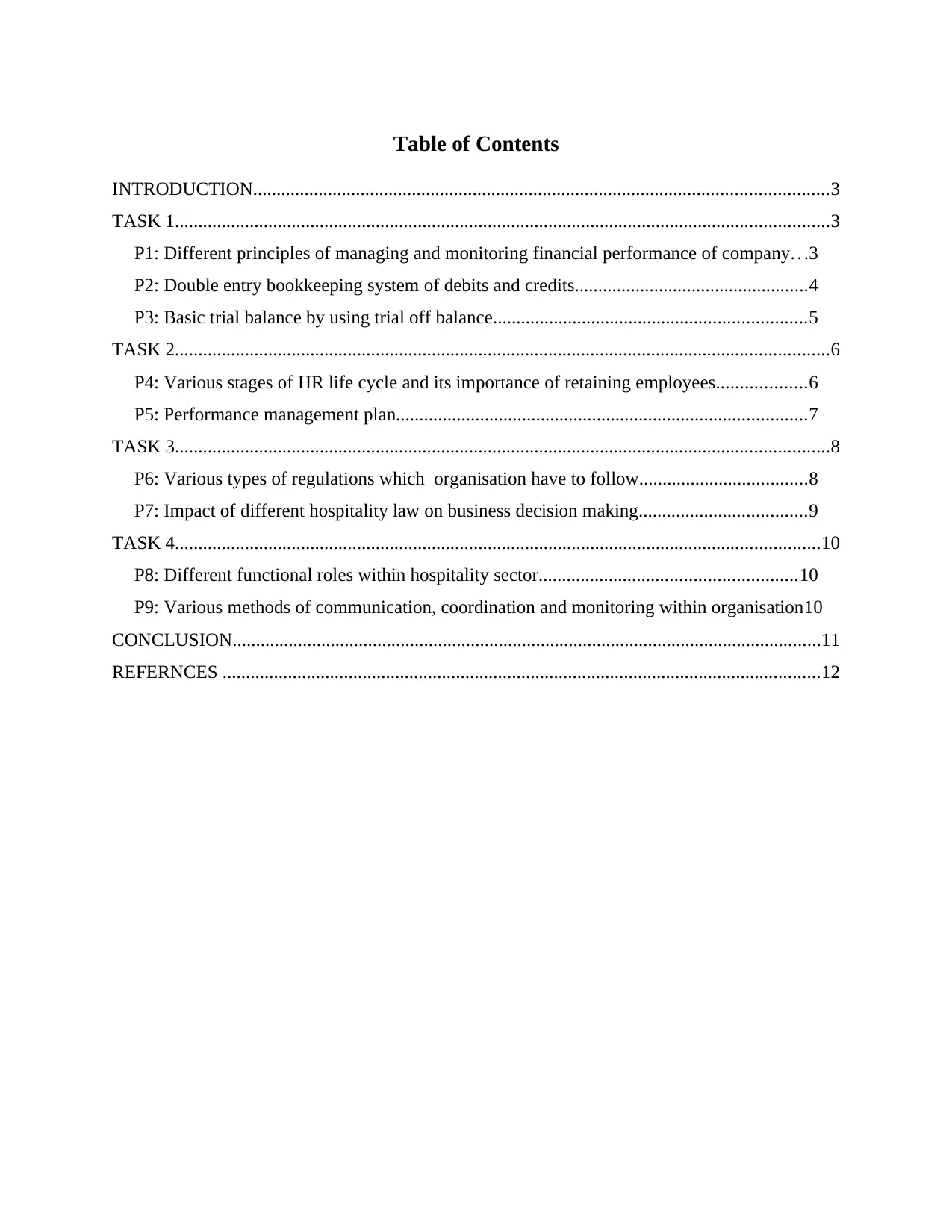
Table of Contents
INTRODUCTION...........................................................................................................................3
TASK 1............................................................................................................................................3
P1: Different principles of managing and monitoring financial performance of company. . .3
P2: Double entry bookkeeping system of debits and credits..................................................4
P3: Basic trial balance by using trial off balance...................................................................5
TASK 2............................................................................................................................................6
P4: Various stages of HR life cycle and its importance of retaining employees...................6
P5: Performance management plan........................................................................................7
TASK 3............................................................................................................................................8
P6: Various types of regulations which organisation have to follow....................................8
P7: Impact of different hospitality law on business decision making....................................9
TASK 4..........................................................................................................................................10
P8: Different functional roles within hospitality sector.......................................................10
P9: Various methods of communication, coordination and monitoring within organisation10
CONCLUSION..............................................................................................................................11
REFERNCES ................................................................................................................................12
INTRODUCTION...........................................................................................................................3
TASK 1............................................................................................................................................3
P1: Different principles of managing and monitoring financial performance of company. . .3
P2: Double entry bookkeeping system of debits and credits..................................................4
P3: Basic trial balance by using trial off balance...................................................................5
TASK 2............................................................................................................................................6
P4: Various stages of HR life cycle and its importance of retaining employees...................6
P5: Performance management plan........................................................................................7
TASK 3............................................................................................................................................8
P6: Various types of regulations which organisation have to follow....................................8
P7: Impact of different hospitality law on business decision making....................................9
TASK 4..........................................................................................................................................10
P8: Different functional roles within hospitality sector.......................................................10
P9: Various methods of communication, coordination and monitoring within organisation10
CONCLUSION..............................................................................................................................11
REFERNCES ................................................................................................................................12
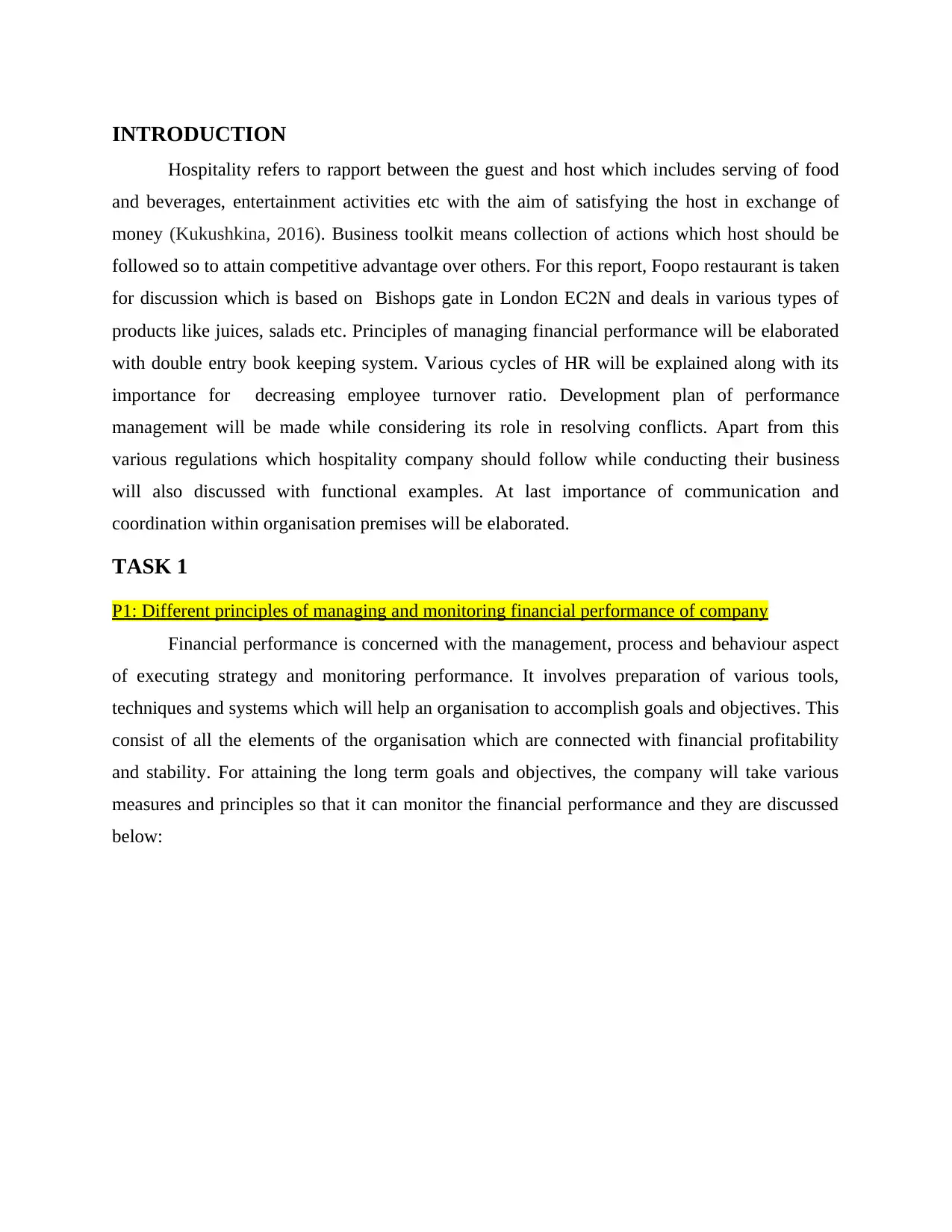
INTRODUCTION
Hospitality refers to rapport between the guest and host which includes serving of food
and beverages, entertainment activities etc with the aim of satisfying the host in exchange of
money (Kukushkina, 2016). Business toolkit means collection of actions which host should be
followed so to attain competitive advantage over others. For this report, Foopo restaurant is taken
for discussion which is based on Bishops gate in London EC2N and deals in various types of
products like juices, salads etc. Principles of managing financial performance will be elaborated
with double entry book keeping system. Various cycles of HR will be explained along with its
importance for decreasing employee turnover ratio. Development plan of performance
management will be made while considering its role in resolving conflicts. Apart from this
various regulations which hospitality company should follow while conducting their business
will also discussed with functional examples. At last importance of communication and
coordination within organisation premises will be elaborated.
TASK 1
P1: Different principles of managing and monitoring financial performance of company
Financial performance is concerned with the management, process and behaviour aspect
of executing strategy and monitoring performance. It involves preparation of various tools,
techniques and systems which will help an organisation to accomplish goals and objectives. This
consist of all the elements of the organisation which are connected with financial profitability
and stability. For attaining the long term goals and objectives, the company will take various
measures and principles so that it can monitor the financial performance and they are discussed
below:
Hospitality refers to rapport between the guest and host which includes serving of food
and beverages, entertainment activities etc with the aim of satisfying the host in exchange of
money (Kukushkina, 2016). Business toolkit means collection of actions which host should be
followed so to attain competitive advantage over others. For this report, Foopo restaurant is taken
for discussion which is based on Bishops gate in London EC2N and deals in various types of
products like juices, salads etc. Principles of managing financial performance will be elaborated
with double entry book keeping system. Various cycles of HR will be explained along with its
importance for decreasing employee turnover ratio. Development plan of performance
management will be made while considering its role in resolving conflicts. Apart from this
various regulations which hospitality company should follow while conducting their business
will also discussed with functional examples. At last importance of communication and
coordination within organisation premises will be elaborated.
TASK 1
P1: Different principles of managing and monitoring financial performance of company
Financial performance is concerned with the management, process and behaviour aspect
of executing strategy and monitoring performance. It involves preparation of various tools,
techniques and systems which will help an organisation to accomplish goals and objectives. This
consist of all the elements of the organisation which are connected with financial profitability
and stability. For attaining the long term goals and objectives, the company will take various
measures and principles so that it can monitor the financial performance and they are discussed
below:
⊘ This is a preview!⊘
Do you want full access?
Subscribe today to unlock all pages.

Trusted by 1+ million students worldwide
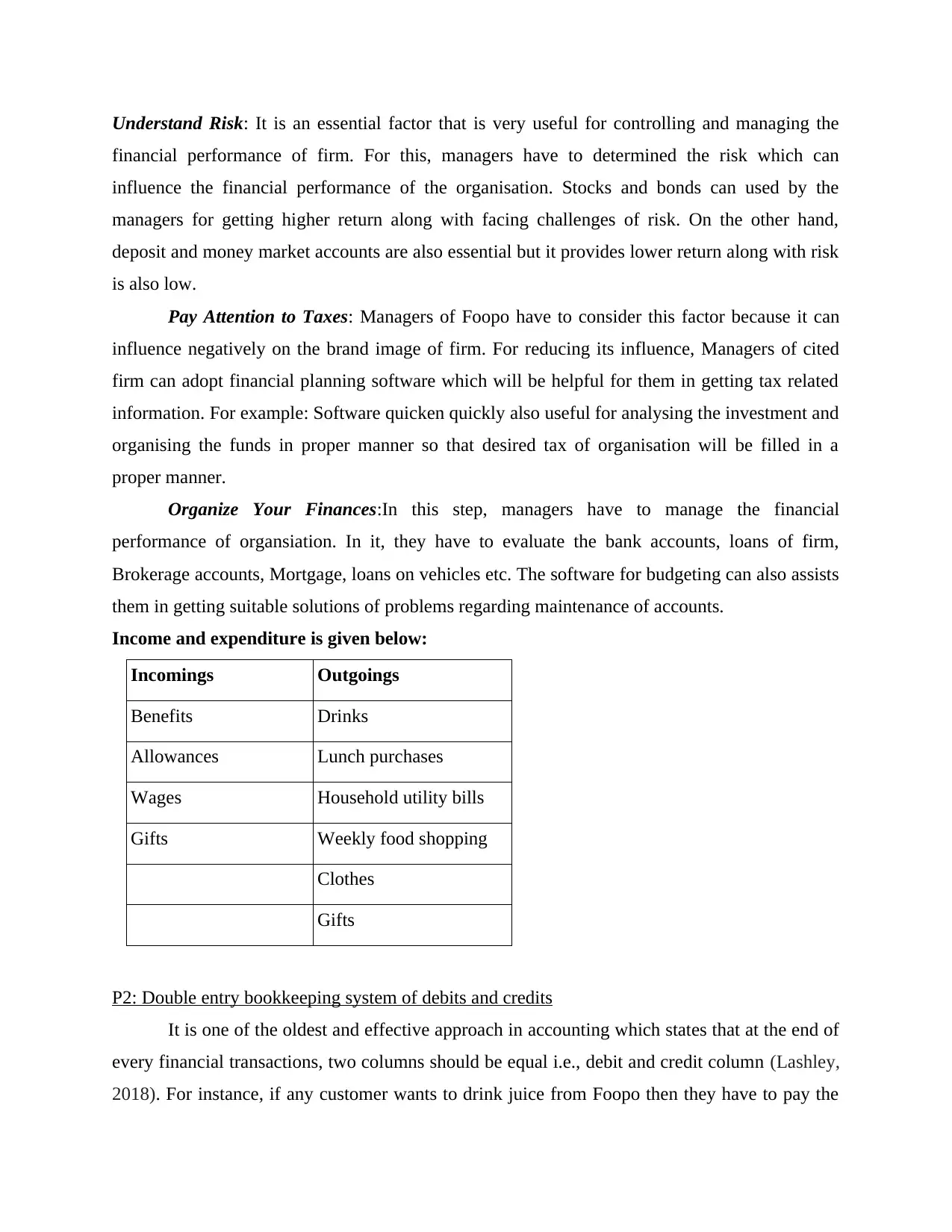
Understand Risk: It is an essential factor that is very useful for controlling and managing the
financial performance of firm. For this, managers have to determined the risk which can
influence the financial performance of the organisation. Stocks and bonds can used by the
managers for getting higher return along with facing challenges of risk. On the other hand,
deposit and money market accounts are also essential but it provides lower return along with risk
is also low.
Pay Attention to Taxes: Managers of Foopo have to consider this factor because it can
influence negatively on the brand image of firm. For reducing its influence, Managers of cited
firm can adopt financial planning software which will be helpful for them in getting tax related
information. For example: Software quicken quickly also useful for analysing the investment and
organising the funds in proper manner so that desired tax of organisation will be filled in a
proper manner.
Organize Your Finances:In this step, managers have to manage the financial
performance of organsiation. In it, they have to evaluate the bank accounts, loans of firm,
Brokerage accounts, Mortgage, loans on vehicles etc. The software for budgeting can also assists
them in getting suitable solutions of problems regarding maintenance of accounts.
Income and expenditure is given below:
Incomings Outgoings
Benefits Drinks
Allowances Lunch purchases
Wages Household utility bills
Gifts Weekly food shopping
Clothes
Gifts
P2: Double entry bookkeeping system of debits and credits
It is one of the oldest and effective approach in accounting which states that at the end of
every financial transactions, two columns should be equal i.e., debit and credit column (Lashley,
2018). For instance, if any customer wants to drink juice from Foopo then they have to pay the
financial performance of firm. For this, managers have to determined the risk which can
influence the financial performance of the organisation. Stocks and bonds can used by the
managers for getting higher return along with facing challenges of risk. On the other hand,
deposit and money market accounts are also essential but it provides lower return along with risk
is also low.
Pay Attention to Taxes: Managers of Foopo have to consider this factor because it can
influence negatively on the brand image of firm. For reducing its influence, Managers of cited
firm can adopt financial planning software which will be helpful for them in getting tax related
information. For example: Software quicken quickly also useful for analysing the investment and
organising the funds in proper manner so that desired tax of organisation will be filled in a
proper manner.
Organize Your Finances:In this step, managers have to manage the financial
performance of organsiation. In it, they have to evaluate the bank accounts, loans of firm,
Brokerage accounts, Mortgage, loans on vehicles etc. The software for budgeting can also assists
them in getting suitable solutions of problems regarding maintenance of accounts.
Income and expenditure is given below:
Incomings Outgoings
Benefits Drinks
Allowances Lunch purchases
Wages Household utility bills
Gifts Weekly food shopping
Clothes
Gifts
P2: Double entry bookkeeping system of debits and credits
It is one of the oldest and effective approach in accounting which states that at the end of
every financial transactions, two columns should be equal i.e., debit and credit column (Lashley,
2018). For instance, if any customer wants to drink juice from Foopo then they have to pay the
Paraphrase This Document
Need a fresh take? Get an instant paraphrase of this document with our AI Paraphraser
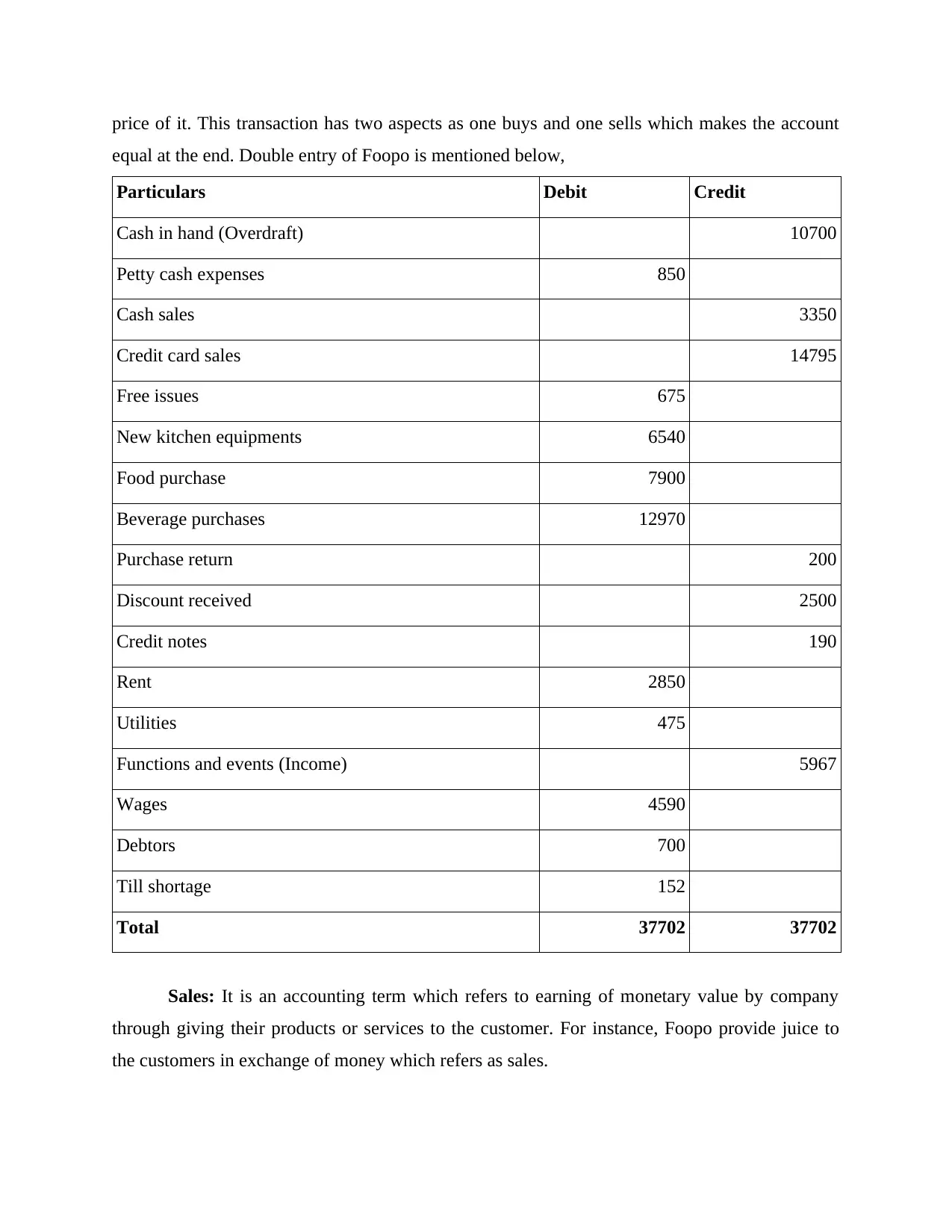
price of it. This transaction has two aspects as one buys and one sells which makes the account
equal at the end. Double entry of Foopo is mentioned below,
Particulars Debit Credit
Cash in hand (Overdraft) 10700
Petty cash expenses 850
Cash sales 3350
Credit card sales 14795
Free issues 675
New kitchen equipments 6540
Food purchase 7900
Beverage purchases 12970
Purchase return 200
Discount received 2500
Credit notes 190
Rent 2850
Utilities 475
Functions and events (Income) 5967
Wages 4590
Debtors 700
Till shortage 152
Total 37702 37702
Sales: It is an accounting term which refers to earning of monetary value by company
through giving their products or services to the customer. For instance, Foopo provide juice to
the customers in exchange of money which refers as sales.
equal at the end. Double entry of Foopo is mentioned below,
Particulars Debit Credit
Cash in hand (Overdraft) 10700
Petty cash expenses 850
Cash sales 3350
Credit card sales 14795
Free issues 675
New kitchen equipments 6540
Food purchase 7900
Beverage purchases 12970
Purchase return 200
Discount received 2500
Credit notes 190
Rent 2850
Utilities 475
Functions and events (Income) 5967
Wages 4590
Debtors 700
Till shortage 152
Total 37702 37702
Sales: It is an accounting term which refers to earning of monetary value by company
through giving their products or services to the customer. For instance, Foopo provide juice to
the customers in exchange of money which refers as sales.
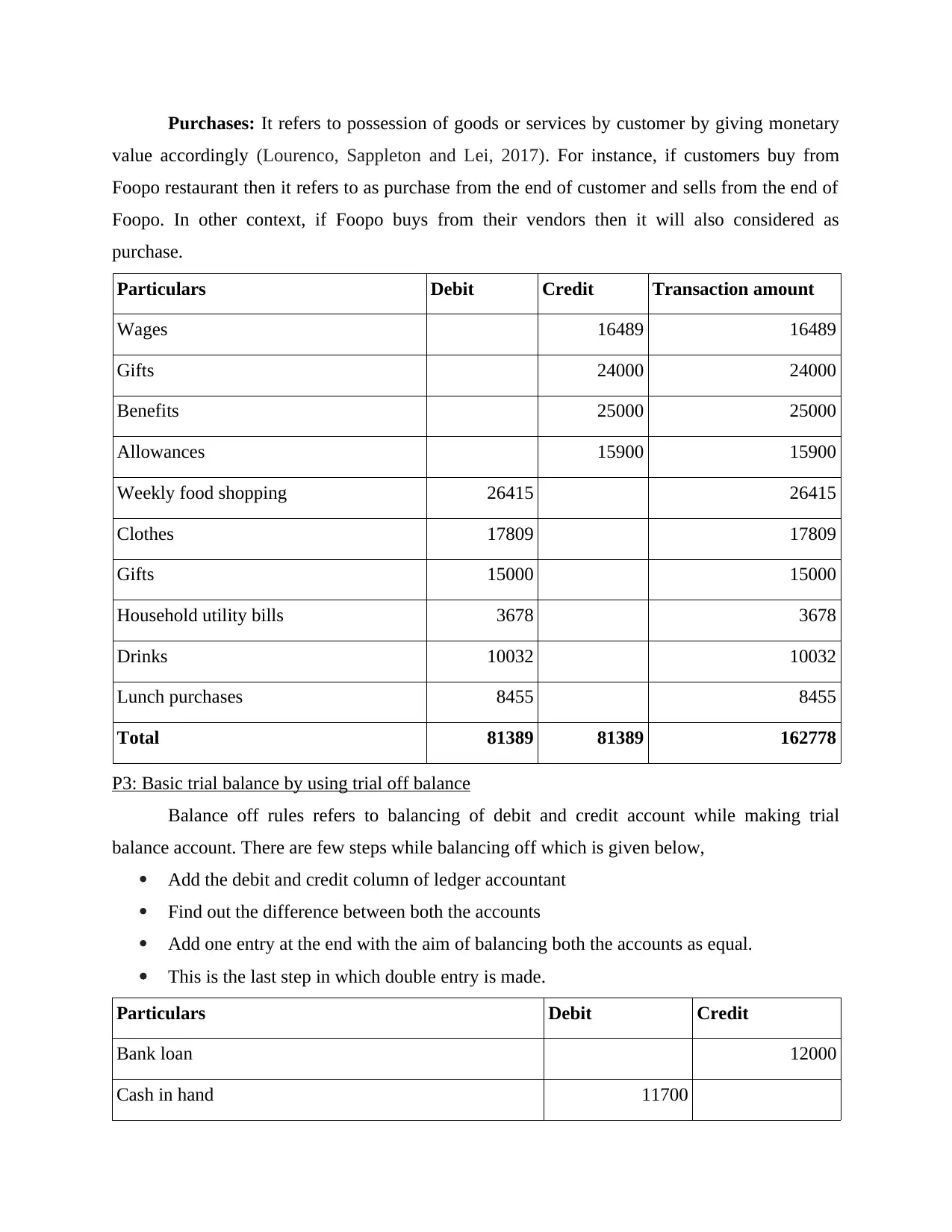
Purchases: It refers to possession of goods or services by customer by giving monetary
value accordingly (Lourenco, Sappleton and Lei, 2017). For instance, if customers buy from
Foopo restaurant then it refers to as purchase from the end of customer and sells from the end of
Foopo. In other context, if Foopo buys from their vendors then it will also considered as
purchase.
Particulars Debit Credit Transaction amount
Wages 16489 16489
Gifts 24000 24000
Benefits 25000 25000
Allowances 15900 15900
Weekly food shopping 26415 26415
Clothes 17809 17809
Gifts 15000 15000
Household utility bills 3678 3678
Drinks 10032 10032
Lunch purchases 8455 8455
Total 81389 81389 162778
P3: Basic trial balance by using trial off balance
Balance off rules refers to balancing of debit and credit account while making trial
balance account. There are few steps while balancing off which is given below,
Add the debit and credit column of ledger accountant
Find out the difference between both the accounts
Add one entry at the end with the aim of balancing both the accounts as equal.
This is the last step in which double entry is made.
Particulars Debit Credit
Bank loan 12000
Cash in hand 11700
value accordingly (Lourenco, Sappleton and Lei, 2017). For instance, if customers buy from
Foopo restaurant then it refers to as purchase from the end of customer and sells from the end of
Foopo. In other context, if Foopo buys from their vendors then it will also considered as
purchase.
Particulars Debit Credit Transaction amount
Wages 16489 16489
Gifts 24000 24000
Benefits 25000 25000
Allowances 15900 15900
Weekly food shopping 26415 26415
Clothes 17809 17809
Gifts 15000 15000
Household utility bills 3678 3678
Drinks 10032 10032
Lunch purchases 8455 8455
Total 81389 81389 162778
P3: Basic trial balance by using trial off balance
Balance off rules refers to balancing of debit and credit account while making trial
balance account. There are few steps while balancing off which is given below,
Add the debit and credit column of ledger accountant
Find out the difference between both the accounts
Add one entry at the end with the aim of balancing both the accounts as equal.
This is the last step in which double entry is made.
Particulars Debit Credit
Bank loan 12000
Cash in hand 11700
⊘ This is a preview!⊘
Do you want full access?
Subscribe today to unlock all pages.

Trusted by 1+ million students worldwide
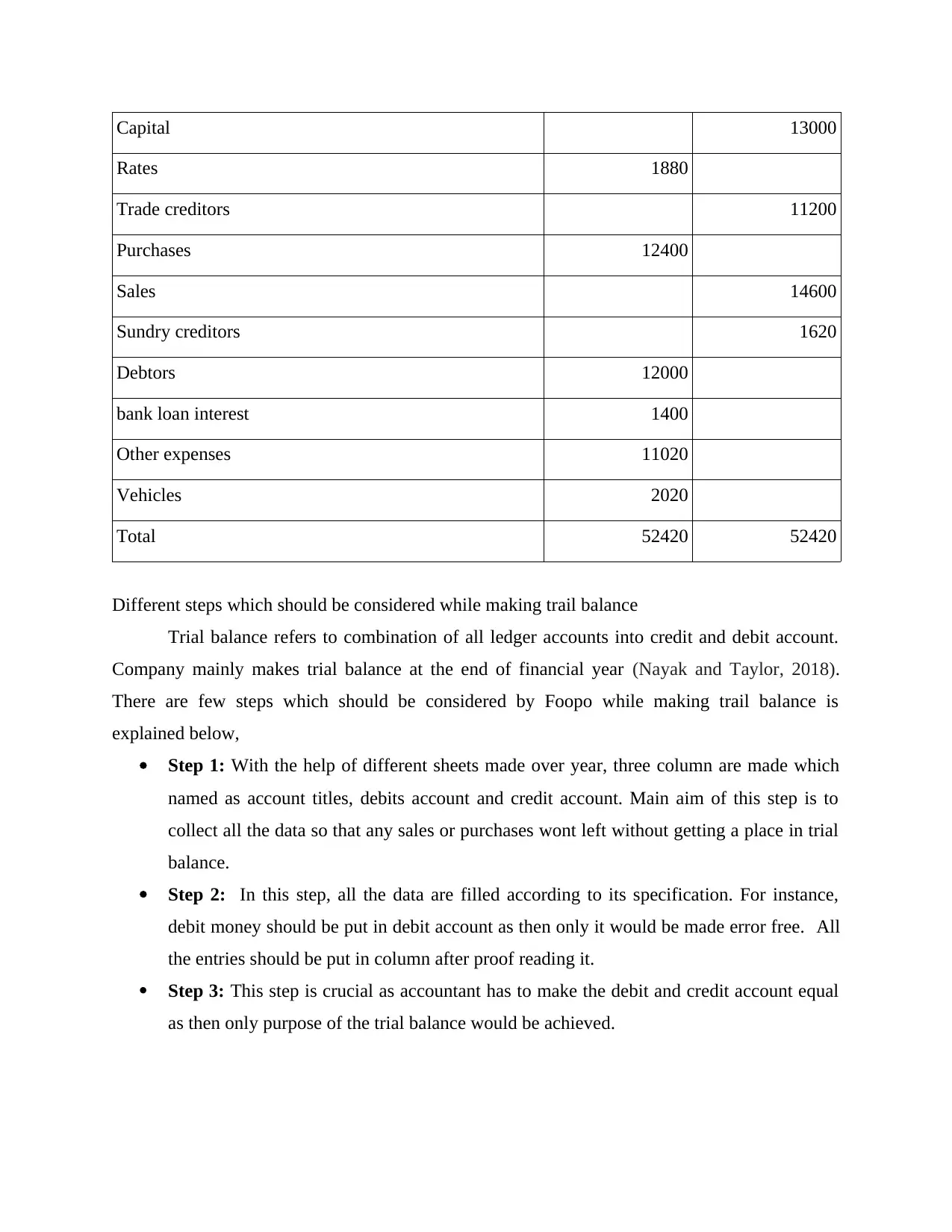
Capital 13000
Rates 1880
Trade creditors 11200
Purchases 12400
Sales 14600
Sundry creditors 1620
Debtors 12000
bank loan interest 1400
Other expenses 11020
Vehicles 2020
Total 52420 52420
Different steps which should be considered while making trail balance
Trial balance refers to combination of all ledger accounts into credit and debit account.
Company mainly makes trial balance at the end of financial year (Nayak and Taylor, 2018).
There are few steps which should be considered by Foopo while making trail balance is
explained below,
Step 1: With the help of different sheets made over year, three column are made which
named as account titles, debits account and credit account. Main aim of this step is to
collect all the data so that any sales or purchases wont left without getting a place in trial
balance.
Step 2: In this step, all the data are filled according to its specification. For instance,
debit money should be put in debit account as then only it would be made error free. All
the entries should be put in column after proof reading it.
Step 3: This step is crucial as accountant has to make the debit and credit account equal
as then only purpose of the trial balance would be achieved.
Rates 1880
Trade creditors 11200
Purchases 12400
Sales 14600
Sundry creditors 1620
Debtors 12000
bank loan interest 1400
Other expenses 11020
Vehicles 2020
Total 52420 52420
Different steps which should be considered while making trail balance
Trial balance refers to combination of all ledger accounts into credit and debit account.
Company mainly makes trial balance at the end of financial year (Nayak and Taylor, 2018).
There are few steps which should be considered by Foopo while making trail balance is
explained below,
Step 1: With the help of different sheets made over year, three column are made which
named as account titles, debits account and credit account. Main aim of this step is to
collect all the data so that any sales or purchases wont left without getting a place in trial
balance.
Step 2: In this step, all the data are filled according to its specification. For instance,
debit money should be put in debit account as then only it would be made error free. All
the entries should be put in column after proof reading it.
Step 3: This step is crucial as accountant has to make the debit and credit account equal
as then only purpose of the trial balance would be achieved.
Paraphrase This Document
Need a fresh take? Get an instant paraphrase of this document with our AI Paraphraser
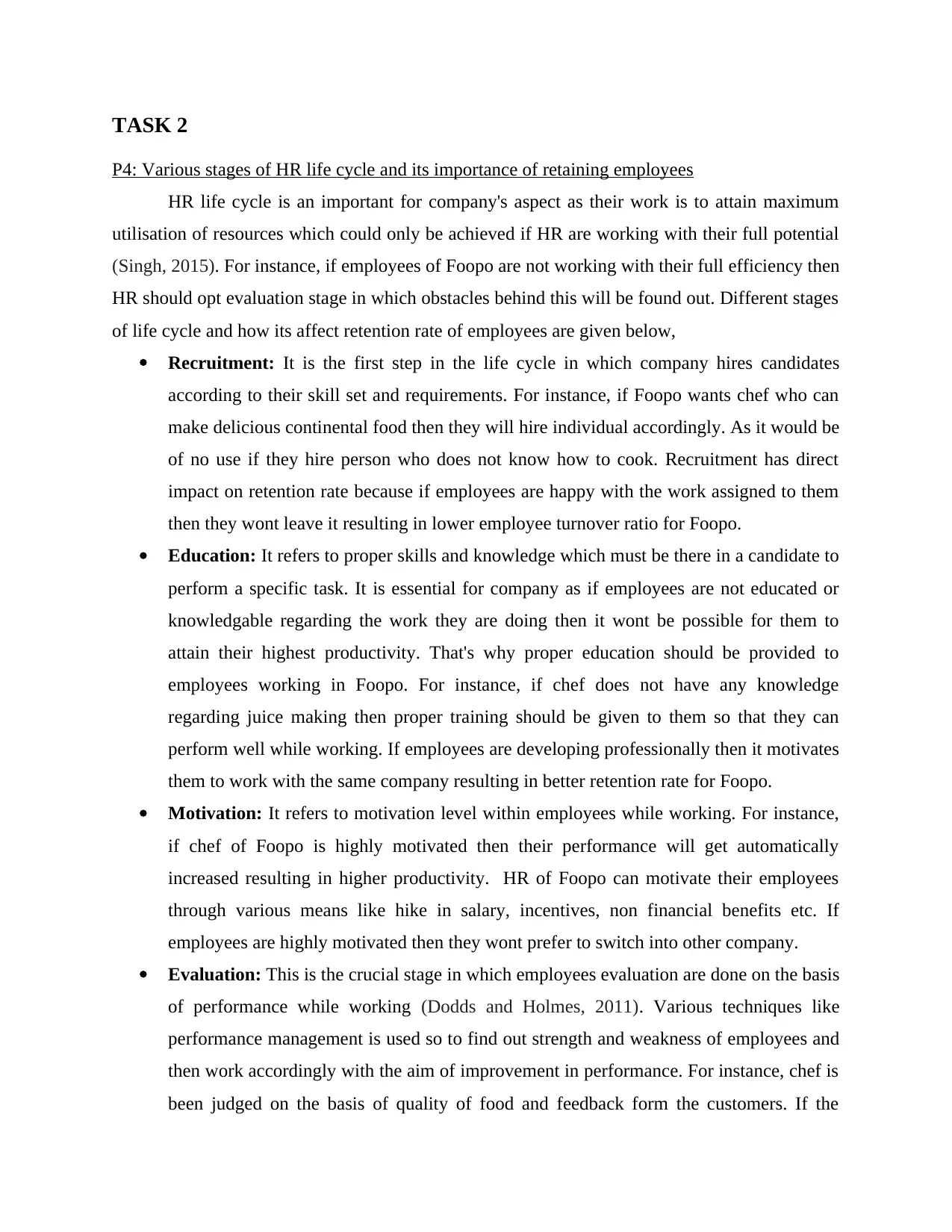
TASK 2
P4: Various stages of HR life cycle and its importance of retaining employees
HR life cycle is an important for company's aspect as their work is to attain maximum
utilisation of resources which could only be achieved if HR are working with their full potential
(Singh, 2015). For instance, if employees of Foopo are not working with their full efficiency then
HR should opt evaluation stage in which obstacles behind this will be found out. Different stages
of life cycle and how its affect retention rate of employees are given below,
Recruitment: It is the first step in the life cycle in which company hires candidates
according to their skill set and requirements. For instance, if Foopo wants chef who can
make delicious continental food then they will hire individual accordingly. As it would be
of no use if they hire person who does not know how to cook. Recruitment has direct
impact on retention rate because if employees are happy with the work assigned to them
then they wont leave it resulting in lower employee turnover ratio for Foopo.
Education: It refers to proper skills and knowledge which must be there in a candidate to
perform a specific task. It is essential for company as if employees are not educated or
knowledgable regarding the work they are doing then it wont be possible for them to
attain their highest productivity. That's why proper education should be provided to
employees working in Foopo. For instance, if chef does not have any knowledge
regarding juice making then proper training should be given to them so that they can
perform well while working. If employees are developing professionally then it motivates
them to work with the same company resulting in better retention rate for Foopo.
Motivation: It refers to motivation level within employees while working. For instance,
if chef of Foopo is highly motivated then their performance will get automatically
increased resulting in higher productivity. HR of Foopo can motivate their employees
through various means like hike in salary, incentives, non financial benefits etc. If
employees are highly motivated then they wont prefer to switch into other company.
Evaluation: This is the crucial stage in which employees evaluation are done on the basis
of performance while working (Dodds and Holmes, 2011). Various techniques like
performance management is used so to find out strength and weakness of employees and
then work accordingly with the aim of improvement in performance. For instance, chef is
been judged on the basis of quality of food and feedback form the customers. If the
P4: Various stages of HR life cycle and its importance of retaining employees
HR life cycle is an important for company's aspect as their work is to attain maximum
utilisation of resources which could only be achieved if HR are working with their full potential
(Singh, 2015). For instance, if employees of Foopo are not working with their full efficiency then
HR should opt evaluation stage in which obstacles behind this will be found out. Different stages
of life cycle and how its affect retention rate of employees are given below,
Recruitment: It is the first step in the life cycle in which company hires candidates
according to their skill set and requirements. For instance, if Foopo wants chef who can
make delicious continental food then they will hire individual accordingly. As it would be
of no use if they hire person who does not know how to cook. Recruitment has direct
impact on retention rate because if employees are happy with the work assigned to them
then they wont leave it resulting in lower employee turnover ratio for Foopo.
Education: It refers to proper skills and knowledge which must be there in a candidate to
perform a specific task. It is essential for company as if employees are not educated or
knowledgable regarding the work they are doing then it wont be possible for them to
attain their highest productivity. That's why proper education should be provided to
employees working in Foopo. For instance, if chef does not have any knowledge
regarding juice making then proper training should be given to them so that they can
perform well while working. If employees are developing professionally then it motivates
them to work with the same company resulting in better retention rate for Foopo.
Motivation: It refers to motivation level within employees while working. For instance,
if chef of Foopo is highly motivated then their performance will get automatically
increased resulting in higher productivity. HR of Foopo can motivate their employees
through various means like hike in salary, incentives, non financial benefits etc. If
employees are highly motivated then they wont prefer to switch into other company.
Evaluation: This is the crucial stage in which employees evaluation are done on the basis
of performance while working (Dodds and Holmes, 2011). Various techniques like
performance management is used so to find out strength and weakness of employees and
then work accordingly with the aim of improvement in performance. For instance, chef is
been judged on the basis of quality of food and feedback form the customers. If the
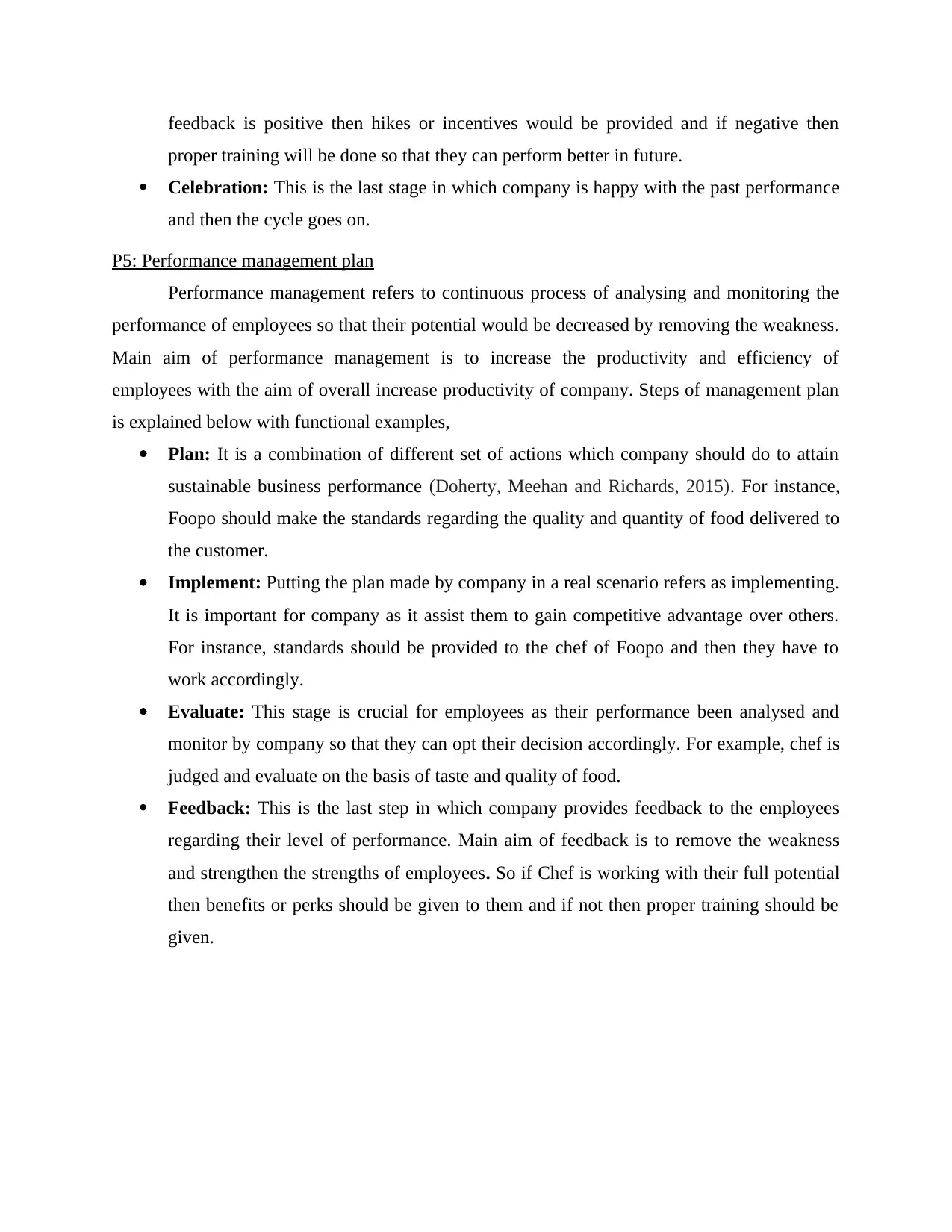
feedback is positive then hikes or incentives would be provided and if negative then
proper training will be done so that they can perform better in future.
Celebration: This is the last stage in which company is happy with the past performance
and then the cycle goes on.
P5: Performance management plan
Performance management refers to continuous process of analysing and monitoring the
performance of employees so that their potential would be decreased by removing the weakness.
Main aim of performance management is to increase the productivity and efficiency of
employees with the aim of overall increase productivity of company. Steps of management plan
is explained below with functional examples,
Plan: It is a combination of different set of actions which company should do to attain
sustainable business performance (Doherty, Meehan and Richards, 2015). For instance,
Foopo should make the standards regarding the quality and quantity of food delivered to
the customer.
Implement: Putting the plan made by company in a real scenario refers as implementing.
It is important for company as it assist them to gain competitive advantage over others.
For instance, standards should be provided to the chef of Foopo and then they have to
work accordingly.
Evaluate: This stage is crucial for employees as their performance been analysed and
monitor by company so that they can opt their decision accordingly. For example, chef is
judged and evaluate on the basis of taste and quality of food.
Feedback: This is the last step in which company provides feedback to the employees
regarding their level of performance. Main aim of feedback is to remove the weakness
and strengthen the strengths of employees. So if Chef is working with their full potential
then benefits or perks should be given to them and if not then proper training should be
given.
proper training will be done so that they can perform better in future.
Celebration: This is the last stage in which company is happy with the past performance
and then the cycle goes on.
P5: Performance management plan
Performance management refers to continuous process of analysing and monitoring the
performance of employees so that their potential would be decreased by removing the weakness.
Main aim of performance management is to increase the productivity and efficiency of
employees with the aim of overall increase productivity of company. Steps of management plan
is explained below with functional examples,
Plan: It is a combination of different set of actions which company should do to attain
sustainable business performance (Doherty, Meehan and Richards, 2015). For instance,
Foopo should make the standards regarding the quality and quantity of food delivered to
the customer.
Implement: Putting the plan made by company in a real scenario refers as implementing.
It is important for company as it assist them to gain competitive advantage over others.
For instance, standards should be provided to the chef of Foopo and then they have to
work accordingly.
Evaluate: This stage is crucial for employees as their performance been analysed and
monitor by company so that they can opt their decision accordingly. For example, chef is
judged and evaluate on the basis of taste and quality of food.
Feedback: This is the last step in which company provides feedback to the employees
regarding their level of performance. Main aim of feedback is to remove the weakness
and strengthen the strengths of employees. So if Chef is working with their full potential
then benefits or perks should be given to them and if not then proper training should be
given.
⊘ This is a preview!⊘
Do you want full access?
Subscribe today to unlock all pages.

Trusted by 1+ million students worldwide
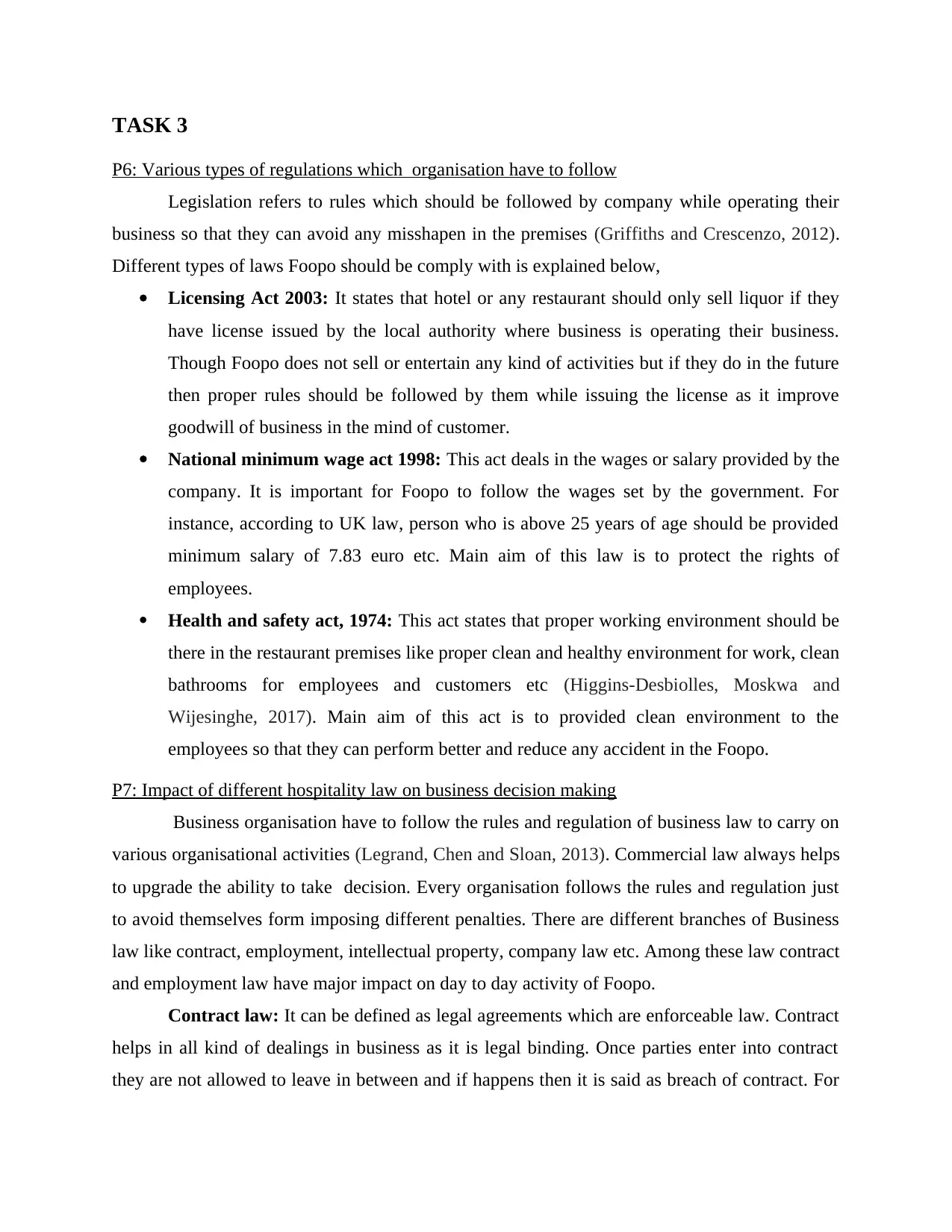
TASK 3
P6: Various types of regulations which organisation have to follow
Legislation refers to rules which should be followed by company while operating their
business so that they can avoid any misshapen in the premises (Griffiths and Crescenzo, 2012).
Different types of laws Foopo should be comply with is explained below,
Licensing Act 2003: It states that hotel or any restaurant should only sell liquor if they
have license issued by the local authority where business is operating their business.
Though Foopo does not sell or entertain any kind of activities but if they do in the future
then proper rules should be followed by them while issuing the license as it improve
goodwill of business in the mind of customer.
National minimum wage act 1998: This act deals in the wages or salary provided by the
company. It is important for Foopo to follow the wages set by the government. For
instance, according to UK law, person who is above 25 years of age should be provided
minimum salary of 7.83 euro etc. Main aim of this law is to protect the rights of
employees.
Health and safety act, 1974: This act states that proper working environment should be
there in the restaurant premises like proper clean and healthy environment for work, clean
bathrooms for employees and customers etc (Higgins-Desbiolles, Moskwa and
Wijesinghe, 2017). Main aim of this act is to provided clean environment to the
employees so that they can perform better and reduce any accident in the Foopo.
P7: Impact of different hospitality law on business decision making
Business organisation have to follow the rules and regulation of business law to carry on
various organisational activities (Legrand, Chen and Sloan, 2013). Commercial law always helps
to upgrade the ability to take decision. Every organisation follows the rules and regulation just
to avoid themselves form imposing different penalties. There are different branches of Business
law like contract, employment, intellectual property, company law etc. Among these law contract
and employment law have major impact on day to day activity of Foopo.
Contract law: It can be defined as legal agreements which are enforceable law. Contract
helps in all kind of dealings in business as it is legal binding. Once parties enter into contract
they are not allowed to leave in between and if happens then it is said as breach of contract. For
P6: Various types of regulations which organisation have to follow
Legislation refers to rules which should be followed by company while operating their
business so that they can avoid any misshapen in the premises (Griffiths and Crescenzo, 2012).
Different types of laws Foopo should be comply with is explained below,
Licensing Act 2003: It states that hotel or any restaurant should only sell liquor if they
have license issued by the local authority where business is operating their business.
Though Foopo does not sell or entertain any kind of activities but if they do in the future
then proper rules should be followed by them while issuing the license as it improve
goodwill of business in the mind of customer.
National minimum wage act 1998: This act deals in the wages or salary provided by the
company. It is important for Foopo to follow the wages set by the government. For
instance, according to UK law, person who is above 25 years of age should be provided
minimum salary of 7.83 euro etc. Main aim of this law is to protect the rights of
employees.
Health and safety act, 1974: This act states that proper working environment should be
there in the restaurant premises like proper clean and healthy environment for work, clean
bathrooms for employees and customers etc (Higgins-Desbiolles, Moskwa and
Wijesinghe, 2017). Main aim of this act is to provided clean environment to the
employees so that they can perform better and reduce any accident in the Foopo.
P7: Impact of different hospitality law on business decision making
Business organisation have to follow the rules and regulation of business law to carry on
various organisational activities (Legrand, Chen and Sloan, 2013). Commercial law always helps
to upgrade the ability to take decision. Every organisation follows the rules and regulation just
to avoid themselves form imposing different penalties. There are different branches of Business
law like contract, employment, intellectual property, company law etc. Among these law contract
and employment law have major impact on day to day activity of Foopo.
Contract law: It can be defined as legal agreements which are enforceable law. Contract
helps in all kind of dealings in business as it is legal binding. Once parties enter into contract
they are not allowed to leave in between and if happens then it is said as breach of contract. For
Paraphrase This Document
Need a fresh take? Get an instant paraphrase of this document with our AI Paraphraser
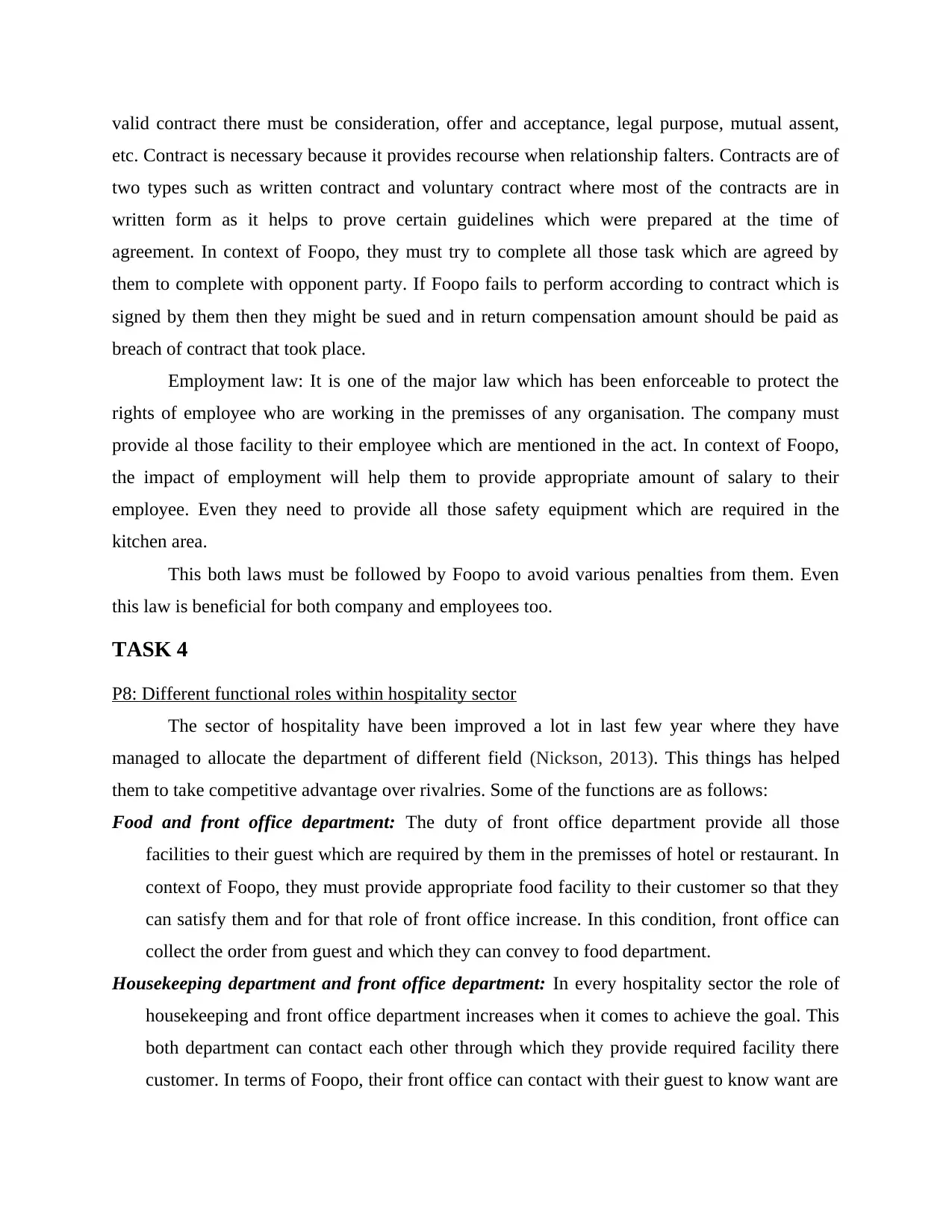
valid contract there must be consideration, offer and acceptance, legal purpose, mutual assent,
etc. Contract is necessary because it provides recourse when relationship falters. Contracts are of
two types such as written contract and voluntary contract where most of the contracts are in
written form as it helps to prove certain guidelines which were prepared at the time of
agreement. In context of Foopo, they must try to complete all those task which are agreed by
them to complete with opponent party. If Foopo fails to perform according to contract which is
signed by them then they might be sued and in return compensation amount should be paid as
breach of contract that took place.
Employment law: It is one of the major law which has been enforceable to protect the
rights of employee who are working in the premisses of any organisation. The company must
provide al those facility to their employee which are mentioned in the act. In context of Foopo,
the impact of employment will help them to provide appropriate amount of salary to their
employee. Even they need to provide all those safety equipment which are required in the
kitchen area.
This both laws must be followed by Foopo to avoid various penalties from them. Even
this law is beneficial for both company and employees too.
TASK 4
P8: Different functional roles within hospitality sector
The sector of hospitality have been improved a lot in last few year where they have
managed to allocate the department of different field (Nickson, 2013). This things has helped
them to take competitive advantage over rivalries. Some of the functions are as follows:
Food and front office department: The duty of front office department provide all those
facilities to their guest which are required by them in the premisses of hotel or restaurant. In
context of Foopo, they must provide appropriate food facility to their customer so that they
can satisfy them and for that role of front office increase. In this condition, front office can
collect the order from guest and which they can convey to food department.
Housekeeping department and front office department: In every hospitality sector the role of
housekeeping and front office department increases when it comes to achieve the goal. This
both department can contact each other through which they provide required facility there
customer. In terms of Foopo, their front office can contact with their guest to know want are
etc. Contract is necessary because it provides recourse when relationship falters. Contracts are of
two types such as written contract and voluntary contract where most of the contracts are in
written form as it helps to prove certain guidelines which were prepared at the time of
agreement. In context of Foopo, they must try to complete all those task which are agreed by
them to complete with opponent party. If Foopo fails to perform according to contract which is
signed by them then they might be sued and in return compensation amount should be paid as
breach of contract that took place.
Employment law: It is one of the major law which has been enforceable to protect the
rights of employee who are working in the premisses of any organisation. The company must
provide al those facility to their employee which are mentioned in the act. In context of Foopo,
the impact of employment will help them to provide appropriate amount of salary to their
employee. Even they need to provide all those safety equipment which are required in the
kitchen area.
This both laws must be followed by Foopo to avoid various penalties from them. Even
this law is beneficial for both company and employees too.
TASK 4
P8: Different functional roles within hospitality sector
The sector of hospitality have been improved a lot in last few year where they have
managed to allocate the department of different field (Nickson, 2013). This things has helped
them to take competitive advantage over rivalries. Some of the functions are as follows:
Food and front office department: The duty of front office department provide all those
facilities to their guest which are required by them in the premisses of hotel or restaurant. In
context of Foopo, they must provide appropriate food facility to their customer so that they
can satisfy them and for that role of front office increase. In this condition, front office can
collect the order from guest and which they can convey to food department.
Housekeeping department and front office department: In every hospitality sector the role of
housekeeping and front office department increases when it comes to achieve the goal. This
both department can contact each other through which they provide required facility there
customer. In terms of Foopo, their front office can contact with their guest to know want are
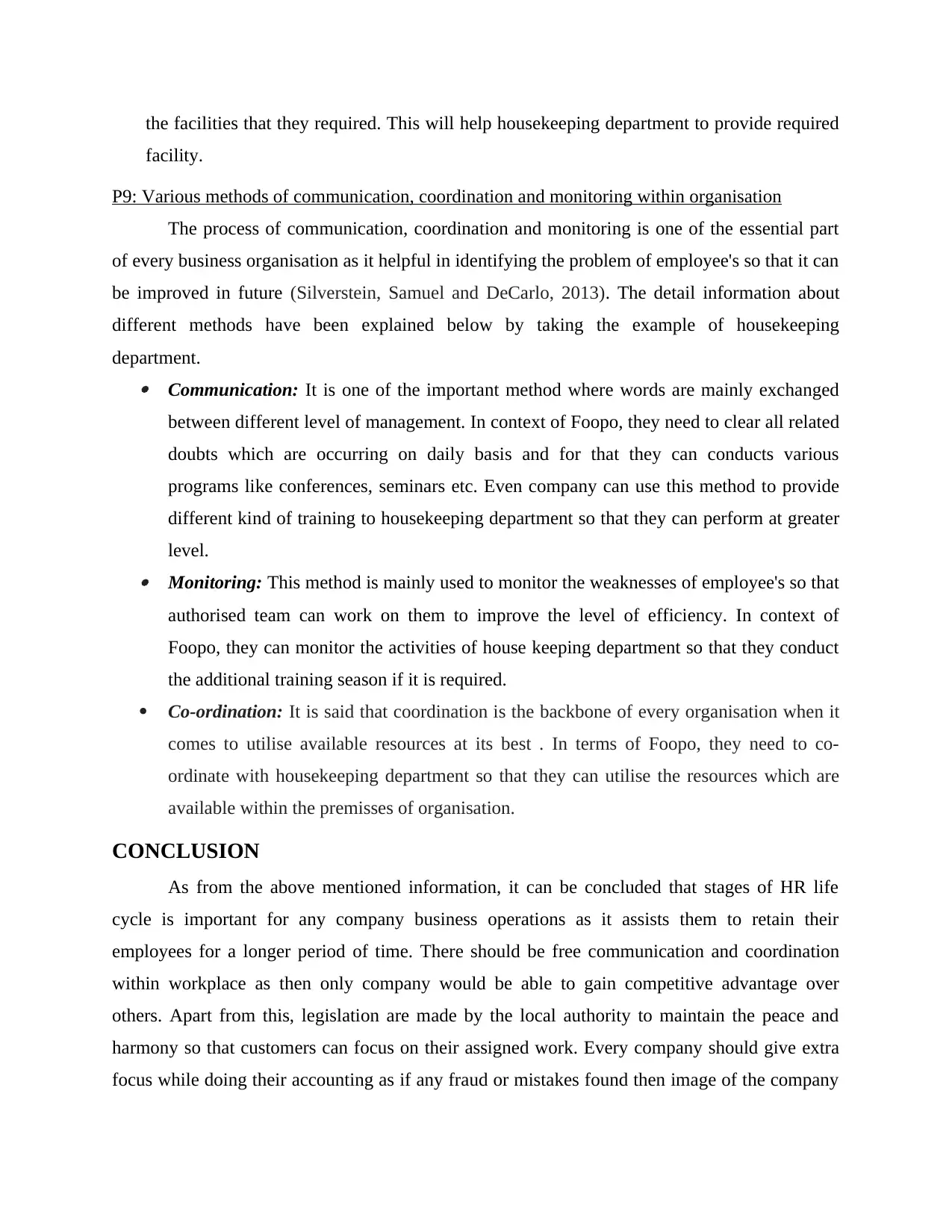
the facilities that they required. This will help housekeeping department to provide required
facility.
P9: Various methods of communication, coordination and monitoring within organisation
The process of communication, coordination and monitoring is one of the essential part
of every business organisation as it helpful in identifying the problem of employee's so that it can
be improved in future (Silverstein, Samuel and DeCarlo, 2013). The detail information about
different methods have been explained below by taking the example of housekeeping
department. Communication: It is one of the important method where words are mainly exchanged
between different level of management. In context of Foopo, they need to clear all related
doubts which are occurring on daily basis and for that they can conducts various
programs like conferences, seminars etc. Even company can use this method to provide
different kind of training to housekeeping department so that they can perform at greater
level. Monitoring: This method is mainly used to monitor the weaknesses of employee's so that
authorised team can work on them to improve the level of efficiency. In context of
Foopo, they can monitor the activities of house keeping department so that they conduct
the additional training season if it is required.
Co-ordination: It is said that coordination is the backbone of every organisation when it
comes to utilise available resources at its best . In terms of Foopo, they need to co-
ordinate with housekeeping department so that they can utilise the resources which are
available within the premisses of organisation.
CONCLUSION
As from the above mentioned information, it can be concluded that stages of HR life
cycle is important for any company business operations as it assists them to retain their
employees for a longer period of time. There should be free communication and coordination
within workplace as then only company would be able to gain competitive advantage over
others. Apart from this, legislation are made by the local authority to maintain the peace and
harmony so that customers can focus on their assigned work. Every company should give extra
focus while doing their accounting as if any fraud or mistakes found then image of the company
facility.
P9: Various methods of communication, coordination and monitoring within organisation
The process of communication, coordination and monitoring is one of the essential part
of every business organisation as it helpful in identifying the problem of employee's so that it can
be improved in future (Silverstein, Samuel and DeCarlo, 2013). The detail information about
different methods have been explained below by taking the example of housekeeping
department. Communication: It is one of the important method where words are mainly exchanged
between different level of management. In context of Foopo, they need to clear all related
doubts which are occurring on daily basis and for that they can conducts various
programs like conferences, seminars etc. Even company can use this method to provide
different kind of training to housekeeping department so that they can perform at greater
level. Monitoring: This method is mainly used to monitor the weaknesses of employee's so that
authorised team can work on them to improve the level of efficiency. In context of
Foopo, they can monitor the activities of house keeping department so that they conduct
the additional training season if it is required.
Co-ordination: It is said that coordination is the backbone of every organisation when it
comes to utilise available resources at its best . In terms of Foopo, they need to co-
ordinate with housekeeping department so that they can utilise the resources which are
available within the premisses of organisation.
CONCLUSION
As from the above mentioned information, it can be concluded that stages of HR life
cycle is important for any company business operations as it assists them to retain their
employees for a longer period of time. There should be free communication and coordination
within workplace as then only company would be able to gain competitive advantage over
others. Apart from this, legislation are made by the local authority to maintain the peace and
harmony so that customers can focus on their assigned work. Every company should give extra
focus while doing their accounting as if any fraud or mistakes found then image of the company
⊘ This is a preview!⊘
Do you want full access?
Subscribe today to unlock all pages.

Trusted by 1+ million students worldwide
1 out of 14
Related Documents
Your All-in-One AI-Powered Toolkit for Academic Success.
+13062052269
info@desklib.com
Available 24*7 on WhatsApp / Email
![[object Object]](/_next/static/media/star-bottom.7253800d.svg)
Unlock your academic potential
Copyright © 2020–2026 A2Z Services. All Rights Reserved. Developed and managed by ZUCOL.





